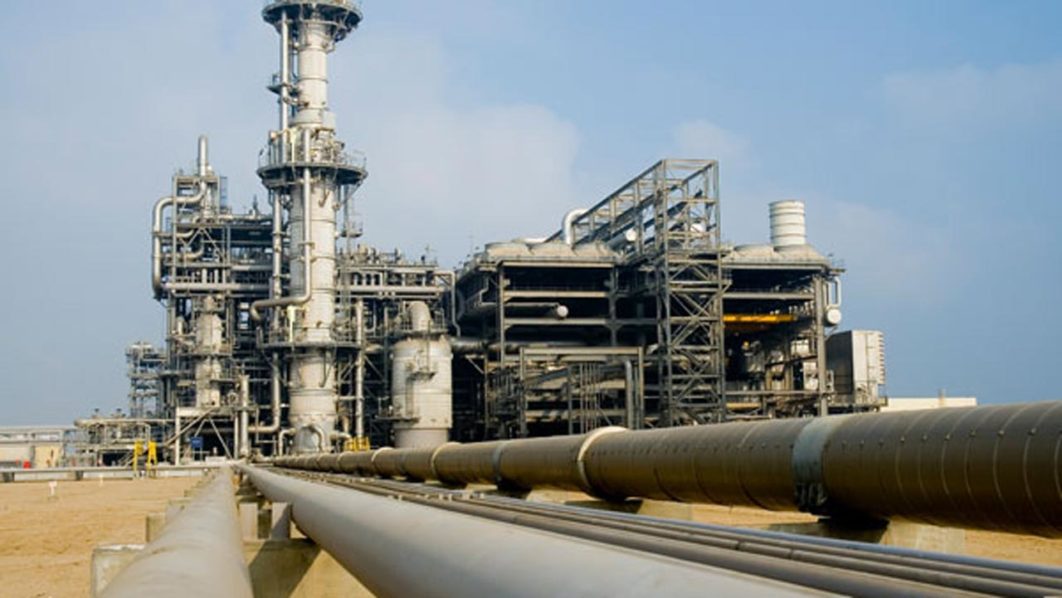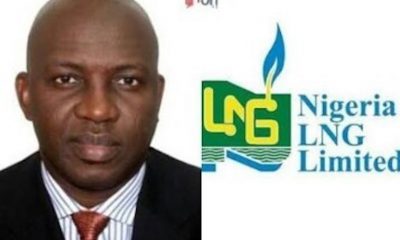Economy
NLNG Not For Sale—FG

By Modupe Gbadeyanka
Minister of State for Petroleum Resource, Mr Ibe Kachikwu, has disclosed that federal government has no intention to put the Nigerian Liquefied Natural Gas Limited (NLNG) up for sale as being speculated.
Mr Kachikwu made this known on Monday while appearing before an investigative hearing established by the House of Representatives to look into the sale of national assets.
The probe panel is led by Mr Fred Agbedi, a lawmaker from Bayelsa State, who is the Chairman of the House Committee on Gas Resources and Allied Matters.
The Minister, who was represented by the Director in charge of Gas Resources in the Ministry, Mrs Esther Ifejika, disclosed that NLNG would not be sold to investors for whatever reason.
“We are not aware of any plans to sell NLNG by the federal government,” Mr Kachikwu emphatically told the lawmakers.
Also at the hearing, Mrs Ifejika, who said the presentation of the Ministry and that of the Nigerian National Petroleum Corporation (NNPC) were harmonized could not proceed further with the presentation as the committee discovered glaring discrepancies in the documents of the Ministry and that of the NNPC as presented by Bello Rabiu, Chief Operating Officer, (Upstream), who represented the Group Managing Director, Maikanti Baru.
Having rejected both documents for lack of authenticity and signature as observed by members, the panel further queried the NNPC and the Ministry over what it called some staggering increases in the upgrade contract of OML 58 and the execution of the Northern Option Pipeline.
TOTAL E&P who handled the Joint Venture contract said the initial contract sum was $3.451 billion, but was eventually increased to $4.6 billion after consideration of a number of factors.
Given the revelation, members of the panel expressed displeasure over the huge variation in the contracts amounting over $1.15 billion.
Members were however told that the NNPC entered into a JV with Total Exploration and Production Nigeria Limited (TEPNG) and there was a Modified Carry Agreement and award to TEPNG to execute the OML 58 Upgrade 1 in 2008, Obite-Ubeta-Rumuji (OUR) pipeline in 2010, and the Northern Option Pipeline in 2011 respectively.
Explaining the process which he said followed laid down procurement processes, Rabiu of the NNPC, informed the panel that no money had been paid on the variations.
He said following the variations raised by the contractor, the board of the corporation suspended the procurement with a view to subjecting same to the Federal Executive Council (FEC), approval, adding that same is being waited.
According to Patrick Olinma, who represented Total’s managing director at the hearing, contract for the upgrade of OML 58 upgrade 1 and the execution of the Northern Option Pipeline were awarded to Saipim/Ponipcelli/Desicon (SPD) and Sapim/Desicon (SD) Consortiums as the major contractors at an initial contract cost ceiling of $1.665 billion and $472million with a completion date of 2012 and 2013.
“However, during execution, these projects encountered some challenges which led to delays and an increased cost of over $3.8 billion and $921m respectively as at December, 2015 and an additional $79m and about $921m incurred upon full completion resulting in the expenditure of about $175m and $170m respectively,” he said.
Similarly, the contract for the execution of the Obite-Ubeta-Rumuji (OUR) pipeline project in 2010 was awarded to Zahem/Baywood Consortium as the major contractor at the carrying cost of $269million, $293 million and $469million.
Members however, posited that the reason for the variations was because the contractor engaged by Total was incompetent resulting in the extra cost.
But the Total representative said that they had a duty to comply with the local content act and that they were told there were 14 communities which in reality were 74 communities.
The Chairman of the Committee said though the parliament made the law, it did not say that the contractor should be employed as a learning curve, adding that the cost is too staggering to be ignored.
At this point, the panel demanded that both NNPC and Total produce the board’s resolution on the contracts before it was awarded to ensure they comply with procurement laws.
Other requirements include, love of adherence to section 21 of the procurement Act which provides for the constitution of a Procurement Planning Committee, with staff from both sides of the divide deciding the mode of procurement.
Also demanded are the market survey, financial bid evaluation with emphasis on inflation and variation variables, as well as financial and technical bid analysis.
Panel also asked for financial updates on payment, status reports on the projects, saying that the motion’s primary concern dwells on the procurement process.
Additional information from The Nation.
Economy
Champion Breweries Concludes Bullet Brand Portfolio Acquisition

By Aduragbemi Omiyale
The acquisition of the Bullet brand portfolio from Sun Mark has been completed by Champion Breweries Plc, a statement from the company confirms.
This marks a transformative milestone in the organisation’s strategic expansion into a diversified, pan-African beverage platform.
With this development, Champion Breweries now owns the Bullet brand assets, trademarks, formulations, and commercial rights globally through an asset carve-out structure.
The assets are held in a newly incorporated entity in the Netherlands, in which Champion Breweries holds a majority interest, while Vinar N.V., the majority shareholder of Sun Mark, retains a minority stake.
Bullet products are currently distributed in 14 African markets, positioning Champion Breweries to scale beyond Nigeria in the high-growth ready-to-drink (RTD) alcoholic and energy drink segments.
This expansion significantly broadens the brewer’s addressable market and strengthens its revenue base with an established, profitable portfolio that already enjoys strong brand recognition and consumer loyalty across multiple markets.
“The successful completion of our public equity raises, together with the formal close of the Bullet acquisition, marks a defining moment for Champion Breweries.
“The support we received from both existing shareholders and new investors reflects strong confidence in our long-term strategy to build a diversified, high-growth beverage platform with pan-African scale.
“Our focus now is on disciplined execution, integration, and delivering sustained value across markets,” the chairman of Champion Breweries, Mr Imo-Abasi Jacob, stated.
Through this transaction, Champion Breweries is expected to achieve enhanced foreign exchange earnings, expanded distribution leverage across African markets, integrated supply chain efficiencies, portfolio diversification into high‑growth consumer beverage categories, and strengthened presence in the RTD and energy drink segments.
The acquisition accelerates Champion Breweries’ transition from a regional brewing business to a multi-category consumer platform with continental reach.
Bullet Black is Nigeria’s leading ready-to-drink alcoholic beverage, while Bullet Blue has built a strong presence in the energy drink category across several African markets.
Economy
M-KOPA Nigeria Plans Expansion to Edo, Others After N231bn Credit Milestone

By Adedapo Adesanya
Emerging market fintech firm, M-KOPA, has announced plans to deepen its reach in Nigeria to the South South and South East regions, starting with Edo this year, after providing N231 billion in credit to over 1 million customers in the country.
The firm released its first Nigeria-focused Impact Report, which showed that Nigeria is M-KOPA’s fastest-growing market and fastest to reach the milestone.
Since its foray into the Nigerian market in 2019, M-KOPA has been working to dismantle barriers to financial inclusion by providing flexible smartphone financing and digital financial tools that align with how people in the informal economy earn and manage their money.
It operates in six states in the country, including Lagos, Ogun, and Oyo, among others.
The report highlights the company’s contribution to income generation, digital inclusion and economic opportunity for Every Day Earners across the country.
The report showed that M-KOPA has enabled 290,000 first-time smartphone users, while 56 per cent of agents accessed their first income opportunity through the platform.
It showed high income and livelihood gains among its users, with about 77 per cent of customers leveraging smartphones or digital loans obtained through the platform to generate income, indicating that access to financed devices is directly supporting micro-entrepreneurial activity and informal sector productivity.
Furthermore, 75 per cent of users report higher earnings since gaining access to M-KOPA’s services, suggesting measurable improvements in personal revenue streams. On the distribution side, 99 per cent of agents disclose increased earnings, reflecting positive spillover effects across the company’s value chain.
In addition, 81 per cent of long-term customers state that their household expenses have improved, pointing to enhanced financial stability and better consumption smoothing over time.
Speaking on the report, Mr Babajide Duroshola, General Manager, M-KOPA Nigeria, said, “Nigeria represents extraordinary potential, and we’re proud that it has become M-KOPA’s fastest-growing market. Our Impact Report shows that when Every Day Earners gain access to the right digital and financial tools, they use them to create stability and long-term progress for their families. This is about access that unlocks opportunity and sustained prosperity.”
On its expansion plans Nigeria-wide, the M-KOPA helmsman said, “Many of the states we are considering are already similar to the ones we are currently in proximity… So, there is proximity and similarity between these states, and that’s what we are going to do, starting with Edo.”
He noted that as M-KOPA Nigeria continues to expand, the focus remains on ensuring more everyday earners gain access to the digital and financial tools they need to build resilient, prosperous futures in Nigeria’s rapidly digitising economy.
Economy
Tinubu Okays Extension of Ban on Raw Shea Nut Export by One Year

By Aduragbemi Omiyale
The ban on the export of raw shea nuts from Nigeria has been extended by one year by President Bola Tinubu.
A statement from the Special Adviser to the President on Information and Strategy, Mr Bayo Onanuga, on Wednesday disclosed that the ban is now till February 25, 2027.
It was emphasised that this decision underscores the administration’s commitment to advancing industrial development, strengthening domestic value addition, and supporting the objectives of the Renewed Hope Agenda.
The ban aims to deepen processing capacity within Nigeria, enhance livelihoods in shea-producing communities, and promote the growth of Nigerian exports anchored on value-added products, the statement noted.
To further these objectives, President Tinubu has authorised the two Ministers of the Federal Ministry of Industry, Trade and Investment, and the Presidential Food Security Coordination Unit (PFSCU), to coordinate the implementation of a unified, evidence-based national framework that aligns industrialisation, trade, and investment priorities across the shea nut value chain.
He also approved the adoption of an export framework established by the Nigerian Commodity Exchange (NCX) and the withdrawal of all waivers allowing the direct export of raw shea nuts.
The President directed that any excess supply of raw shea nuts should be exported exclusively through the NCX framework, in accordance with the approved guidelines.
Additionally, he directed the Federal Ministry of Finance to provide access to a dedicated NESS Support Window to enable the Federal Ministry of Industry, Trade and Investment to pilot a Livelihood Finance Mechanism to strengthen production and processing capacity.
Shea nuts, the oil-rich fruits from the shea tree common in the Savanna belt of Nigeria, are the raw material for shea butter, renowned for its moisturising, anti-inflammatory, and antioxidant properties. The extracted butter is a principal ingredient in cosmetics for skin and hair, as well as in edible cooking oil. The Federal Government encourages processing shea nuts into butter locally, as butter fetches between 10 and 20 times the price of the raw nuts.
The federal government said it remains committed to policies that promote inclusive growth, local manufacturing and position Nigeria as a competitive participant in global agricultural value chains.
-

 Feature/OPED6 years ago
Feature/OPED6 years agoDavos was Different this year
-
Travel/Tourism10 years ago
Lagos Seals Western Lodge Hotel In Ikorodu
-

 Showbiz3 years ago
Showbiz3 years agoEstranged Lover Releases Videos of Empress Njamah Bathing
-

 Banking8 years ago
Banking8 years agoSort Codes of GTBank Branches in Nigeria
-

 Economy3 years ago
Economy3 years agoSubsidy Removal: CNG at N130 Per Litre Cheaper Than Petrol—IPMAN
-

 Banking3 years ago
Banking3 years agoSort Codes of UBA Branches in Nigeria
-

 Banking3 years ago
Banking3 years agoFirst Bank Announces Planned Downtime
-

 Sports3 years ago
Sports3 years agoHighest Paid Nigerian Footballer – How Much Do Nigerian Footballers Earn



















